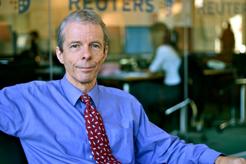How do you solve a problem like the banks?
Release Date 12 September 2011

Professor Brian Scott-Quinn, non-executive Chairman of the ICMA Centre, the business school for financial markets, outlines the main findings of the Independent Commission on Banking, which reported on Monday 12 September.
The Commission, chaired by Sir John Vickers, was established by the Chancellor of the Exchequer in June 2010 to recommend changes to the UK banking industry structure following the worst financial crisis in living memory. The Commission was asked to consider reforms to the UK banking sector to promote financial stability and also to make the market in the provision of retail bank services more competitive.
The twin objectives, ‘financial stability' and ‘competition', are key. Financial stability means avoiding another banking collapse. Its opposite, instability, is something that, were it to happen again, would probably topple any government on whose watch it happened. But, more importantly, the problem faced by the authorities is that they no longer have the firepower to put out the flames from another banking fiasco. Banks, as we have discovered recently, have a symbiotic relationship with governments and can cause the collapse of the sovereign authority itself.
The need for more competition is to avoid the banks making themselves safer and their employees increasingly richer, simply by exploiting the consumer due to an uncompetitive market for retail banking services.
The recommendations of the Commission in respect of UK banks fall essentially into three areas:
- ‘Ringfencing' the high street retail banking business from the wholesale City of London investment banking business
- Increasing the amount of equity capital which retail banks must employ to finance their operations in order to provide more protection to depositors and hence to the taxpayer
- Proposing to the Government that Lloyds Bank sells the branches it must by law divest, to another large banking group, rather than a new banking group, in order to make that group a truly stronger competitor to Lloyds.
Ringfencing is thought by many analysts and commentators to be, on balance, a worthwhile step despite the objections that the major banks have raised in respect of the proposal. It would do no more than take us back to earlier times before 1986 when banks and investment banking were separate and when the economy was actually growing much faster than it is today. It would also force the retail component of the bank to focus on the ‘real economy' i.e. lending to businesses and households rather than trying to find ways to create assets to trade independently of what might be happening in the real sector. With ringfencing, if the retail part of the bank got into difficulties it could be rescued, ‘resolved' to use the jargon, at much lower cost to the taxpayer than the banking companies we have today. On the other hand the trading part of the bank could be allowed to collapse with few shedding a tear.
Would ringfencing prevent another crisis? Of itself probably not. But, in combination with the greatly enhanced capital requirements that the Commission recommends, which are considerably in excess of the minimum levels global regulators are pressing for, it certainly makes collapse less likely and, were it to happen, less expensive for the taxpayer.
Competition is also key to reforming the banks since without it banks may become lazy, impose unjustified charges and try to ensure that pay for employees comes before customer service and low charges.
In summary, the outcome of the deliberations of the Vickers Commission (IBC) represents a good step in the right direction towards returning retail banking to its former role - helping the growth of the real economy. But, equally, it is only one set of the many reforms that need to be taken over the years ahead to provide the UK with a banking system that will also be safe and not be liable to plunge the country yet again into a state of financial instability.
ENDS
Professor Scott-Quinn is a former practitioner in securities trading and is a renowned expert in financial markets. He set up the ICMA Centre (International Capital Markets Association Centre) at the University of Reading in 1991, which is now part of Henley Business School.
